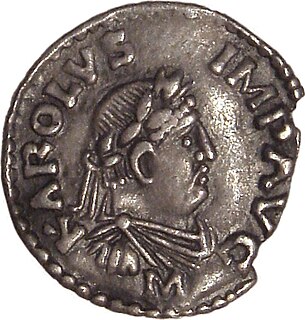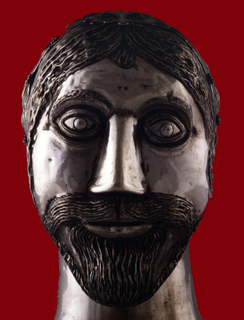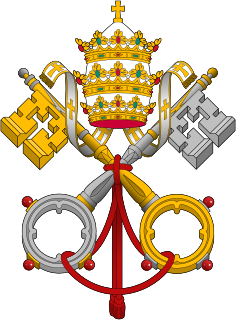
The Eastern Orthodox Church, also called the Orthodox Church, is the second-largest Christian church, with approximately 220 million baptized members. It operates as a communion of autocephalous congregations, each governed by its bishops and adherents in local synods. The church has no central doctrinal or governmental authority analogous to the Head of the Roman Catholic Church, the Pope, but the Ecumenical Patriarch of Constantinople is recognized by them as primus inter pares and regarded as the spiritual leader of many of the eastern Christian parishes. As one of the oldest surviving religious institutions in the world, the Eastern Orthodox Church has played a prominent role in the history and culture of Eastern and Southeastern Europe, the Caucasus, and the Near East. The Eastern Orthodox Church officially calls itself the Orthodox Catholic Church.

The Holy See, also called the See of Rome, Petrine See or Apostolic See, is the jurisdiction of the Pope in his role as the bishop of Rome. It includes the apostolic episcopal see of the Diocese of Rome, which has universal ecclesiastical jurisdiction over the Catholic Church, and the sovereign city-state known as Vatican City.
Latin is an Italic language, originally spoken in ancient Rome and its empire.

The pope, also known as supreme pontiff, Roman pontiff or sovereign pontiff, is the bishop of Rome, head of the worldwide Catholic Church, and head of state or sovereign of the Vatican City State. From a Catholic viewpoint, the primacy of the bishop of Rome is largely derived from his role as the apostolic successor to Saint Peter, to whom primacy was conferred by Jesus, who gave Peter the Keys of Heaven and the powers of "binding and loosing", naming him as the "rock" upon which the Church would be built. The current pope is Francis, who was elected on 13 March 2013.

Western Christianity is one of two sub-divisions of Christianity. Western Christianity is composed of the Latin Church and Protestantism, together with their offshoots such as the Old Catholic Church, Independent Catholicism and Restorationism.

The Holy Roman Emperor, originally and officially the Emperor of the Romans during the Middle Ages, and also known as the German-Roman Emperor since the early modern period, was the ruler and head of state of the Holy Roman Empire. The empire was considered by the Roman Catholic Church to be the only successor of the Roman Empire during the Middle Ages and the early modern period. The title was held in conjunction with the title of king of Italy from the 8th to the 16th century, and, almost without interruption, with the title of king of Germany throughout the 12th to 18th centuries.

Pope Fabian was the bishop of Rome from 10 January 236 to his death on 20 January 250, succeeding Anterus. A dove is said to have descended on his head to mark him as the Holy Spirit's unexpected choice to become the next pope. He was succeeded by Cornelius.
Rome is the English form of the name of the capital city of Italy, and formerly capital of the Roman Empire and seat of the papacy, where it consistently has been called Roma.

The highest-ranking bishops in Eastern Orthodoxy, Oriental Orthodoxy, the Catholic Church, the Hussite Church, and the Church of the East are termed patriarchs.

Babylon the Great, commonly known as the Whore of Babylon, refers to both a symbolic female figure and place of evil mentioned in the Book of Revelation in the Bible. Her full title is stated in Revelation 17 as "Mystery, Babylon the Great, the Mother of Prostitutes and Abominations of the Earth".

Christian Church is an ecclesiological term referring to what different Christian denominations conceive of as being the true body of Christians or the original institution established by Jesus. "Christian Church" has also been used in academia as a synonym for Christianity.

The continuation, succession and revival of the Roman Empire is a running theme of the history of Europe and the Mediterranean Basin. It reflects the lasting memories of power and prestige associated with the Roman Empire itself.

The Catholic Church, also known as the Roman Catholic Church, is the largest Christian church, with 1.3 billion baptised Catholics worldwide as of 2019. As the world's oldest and largest continuously functioning international institution, it has played a prominent role in the history and development of Western civilisation. The church consists of 24 particular churches and almost 3,500 dioceses and eparchies around the world. The pope, who is the bishop of Rome, is the chief pastor of the church. The bishopric of Rome, known as the Holy See, is the central governing authority of the church. The administrative body of the Holy See, the Roman Curia, has its principal offices in Vatican City, a small enclave of Rome, of which the pope is head of state.
The term City of God may refer to the unity between the Holy Roman Empire and the Roman Catholic Church in the Middle Ages. The term may also refer to:

Catholicity is a concept pertaining to beliefs and practices widely accepted across numerous Christian denominations, most notably those that describe themselves as catholic in accordance with the Four Marks of the Church, as expressed in the Nicene Creed of the First Council of Constantinople in 381: "[I believe] in one, holy, catholic, and apostolic Church."
The Catholic Church, sometimes called the Roman Catholic Church, is the largest Christian church body.

"Roman Catholic" is sometimes used to differentiate members of the Catholic Church in full communion with the pope in Rome from other Christians who also self-identify as "Catholic". It is also sometimes used to differentiate adherents to the Latin Church and its Roman rite from other Catholics, i.e. adherents of the Eastern Catholic Churches of various Eastern rites. It is not the official name preferred by the Holy See or bishops in full communion with the pope as a designation for their faith or institution.
Vatican City, the city-state ruled by the pope in Rome, including St. Peter's Basilica, Sistine Chapel, Vatican Museums

The following outline is provided as an overview of and topical guide to the Catholic Church:
Roman Catholic Church, Roman Church or Church of Rome may refer to:











